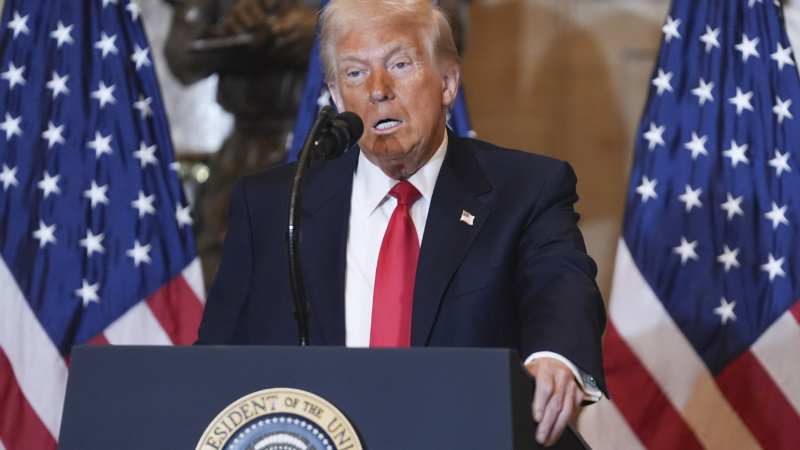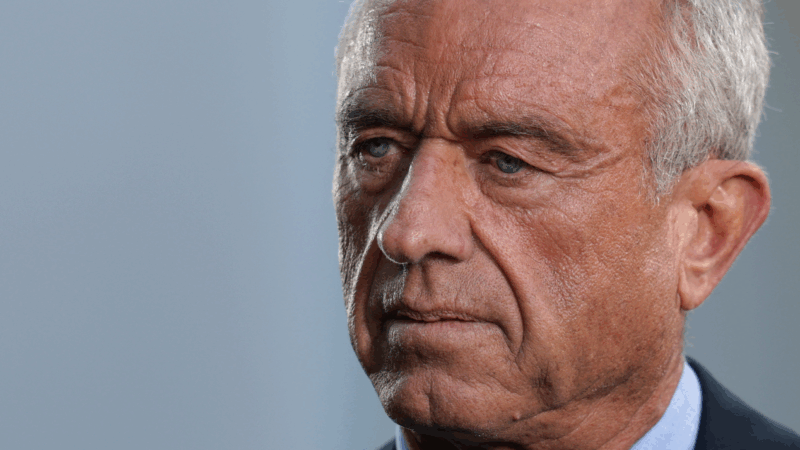Trump vowed to end surprise medical bills. The team working on that just got slashed
As President Donald Trump wrapped up his first term in 2020, he signed legislation to protect Americans from surprise medical bills. “This must end,” Trump said. “We’re going to hold insurance companies and hospitals totally accountable.”
But the president’s wide-ranging push to slash government spending, led by billionaire Elon Musk, is weakening the federal office charged with implementing the No Surprises Act.
Some 15% of those working at the federal Center for Consumer Information and Insurance Oversight, or CCIIO, were fired two weeks ago, according to the agency’s former deputy director in charge of operations, Jeff Grant.
And while the full impact of the cutbacks is still coming into focus, the retrenchment is threatening work at an agency already laboring to run an overstretched system for resolving sometimes very large bills from out-of-network medical providers.
“It’s a hot mess,” Grant said of the job cuts in an interview with KFF Health News. “The chaos has put everyone in a tailspin.”
The cuts, which affected 82 of the federal office’s employees, also risk delaying critical new rules designed to speed the process of adjudicating disputes over surprise bills between health plans and medical providers.
Grant, who was the top career official at CCIIO, retired last week after 41 years in government. He blasted the layoffs as a “grievous error” in a strongly worded letter to the acting human resources director, criticizing him for cutting jobs without regard for the qualifications of employees or the needs of the agency.
Health insurers have also raised concerns about maintaining the agency’s work on surprise bills.
Spokespeople for the Department of Health and Human Services, led by Robert F. Kennedy Jr., did not respond to questions about the job cuts.
The CCIIO, a small part of the federal health agency, was created by the 2010 Affordable Care Act and charged with ensuring that health insurance plans meet standards established by the law to protect patients.
After Congress passed the No Surprises Act in 2020, the office assumed additional responsibility for setting up and administering the complex process for protecting patients from surprise bills.
The work drew support from Democrats and Republicans, who’d been inundated with stories of patients hit by huge bills from emergency physicians, anesthesiologists, and other providers who were not in patients’ insurance networks, even when patients received care at in-network hospitals.
“We will end surprise medical billing,” Trump promised on the campaign trail in 2020. “The days of ripping off patients are over.”
The law barred medical providers in most cases from pursuing patients over surprise bills. This prohibition is not directly affected by the recent job cuts ordered by Musk’s Department of Government Efficiency, created by Trump through an executive order.
But the CCIIO had been working to streamline a system established by the No Surprises Act to resolve disagreements between health plans and medical providers over out-of-network bills. This key protection was put in place so patients would not be caught in the middle of billing disputes.
The system, known as independent dispute resolution, or IDR, has been inundated with hundreds of thousands of cases. In 2023, more than 650,000 new disputes were filed, according to a recent analysis published in the journal Health Affairs.
“The No Surprises Act has protected millions of Americans from receiving surprise medical bills,” said Jennifer Jones, who directs legislative policy at the Blue Cross Blue Shield Association, an insurance trade group. “But issues with the independent dispute resolution process,” she added, “are driving up costs for patients and employers.”
Also overwhelmed has been a consumer reporting system designed to allow patients to lodge complaints if they feel they have been unfairly targeted with a surprise bill.
Under former President Joe Biden, the CCIIO had been working on new rules to make dispute resolution more efficient, which experts said would make a difference.
“If this rule becomes final and works as well as intended, it should help more out-of-network claims get resolved,” said Jack Hoadley, an emeritus research professor at Georgetown University, who has studied surprise medical billing.
But the new rules weren’t finished before Biden left office. And the senior official overseeing this work left his job in January. The recent cuts hit the remaining CCIIO staffers working on the No Surprises Act, according to Grant and other sources familiar with the layoffs, who asked not to be identified out of fear of professional retaliation.
Grant said senior CCIIO officials were since able to shift some employees around and got permission to recall some of the 82 people let go. But he said there is no guarantee that all of them will want to come back to the diminished agency.
Even more concerning, Grant said, are deeper cuts that the White House has told federal agencies to prepare for by March 13.
“These cuts were pretty bad,” Grant said. “What happens next will be even more important.”
KFF Health News is a national newsroom that produces in-depth journalism about health issues and is one of the core operating programs at KFF.
Trump says 8 EU countries to be charged 10% tariff for opposing US control of Greenland
In a post on social media, Trump said a 10% tariff will take effect on Feb. 1, and will climb to 25% on June 1 if a deal is not in place for the United States to purchase Greenland.
‘Not for sale’: massive protest in Copenhagen against Trump’s desire to acquire Greenland
Thousands of people rallied in Copenhagen to push back on President Trump's rhetoric that the U.S. should acquire Greenland.
Uganda’s longtime leader declared winner in disputed vote
Museveni claims victory in Uganda's contested election as opposition leader Bobi Wine goes into hiding amid chaos, violence and accusations of fraud.
Opinion: Remembering Ai, a remarkably intelligent chimpanzee
We remember Ai, a highly intelligent chimpanzee who lived at the Primate Research Institute of Kyoto University for most of her life, except the time she escaped and walked around campus.
The near death — and last-minute reprieve — of a trial for an HIV vaccine
A trial was about to launch for a vaccine that would ward off the HIV virus. It would be an incredible breakthrough. Then it looked as if it would be over before it started.
Is RFK Jr.’s Administration for a Healthy America — AHA — in the works or not?
The Administration for a Healthy America is RFK Jr.'s plan to tackle chronic disease, addiction and other persistent problems. But so far it's not being set up like previous new agencies.






